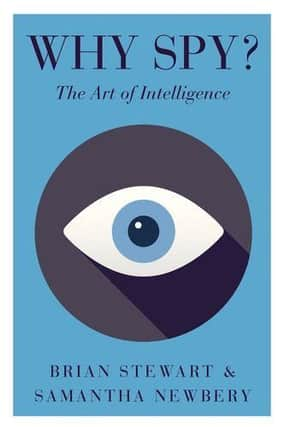Book review: Why Spy? by Brian Stewart and Samantha Newbery


WHY SPY?
BY BRIAN STEWART & SAMANTHA NEWBERY
Hurst Publishers, 288pp, £25
Stewart realised that she was the collaborator who could help bring his story and insights to a younger readership. Why Spy? is the fascinating result. Its four parts are divided into 13 short chapters, which are in fact concise essays on all aspects of spying.
The chapters on types of intelligence, how intelligence is (or should be) assessed and deception operations are riveting, full of illuminating detail. “Hunch intelligence” emerges as the first source in the American dossier showing that the Soviets were planning to site missiles on Cuba in 1962, while “exile intelligence” is shown to have been faulty in the preparation for the 1961 Bay of Pigs operation against Cuba, and the Iraq War of 2003. It is good to see “trash intelligence” (called “dumpster diving” by some spies) acknowledged, and to learn of the “deception ops” ruse from the 1745 Jacobite rebellion, in which small detachments of Jacobites, ostensibly seeking billets and supplies, deceived the Hanoverians as to their actual plans, and the size of their force.
Advertisement
Hide AdA great strength of the book is the fact that Brian Stewart is a Chinese speaker and saw most of his active intelligence service in the Far East – a huge region which is often ignored by writers on espionage. Stewart’s views on American intelligence during the Vietnam War are particularly significant as he was stationed in Hanoi during that war, and is able to compare the American intelligence failures then with the British successes in the Malayan Emergency, as he was based in Malaya in the late 1940s and early 1950s. He predicted the rise of Jiang Zemin to the very top of the Chinese government, and notes that even graffiti can be a source of intelligence, having spotted, during Mao Tse Tung’s time, some very rude words about the Chairman painted on the walls of a Chinese urinal.
Also pertinent are the sections on more recent events. Stewart is clear that the “wall-standing, hooding and white noise,” techniques criticised during the Northern Ireland Troubles were for security, to isolate suspects from each other and to disguise where they were being held. They should not be described as methods of interrogation, or torture, he argues. On the Iraq war, and the “sexing-up” of the Joint Intelligence Committee’s document for Downing Street, his strong view is that JIC papers should not be released, and certainly not at the time of the crises it is being required to assess. Stewart’s discussion of the strength and assessment of the intelligence before the Iraq war, and the subsequent official inquiries, is both astute and authoritative.
The book is not without its faults. The chapters on Special Operations and Assassination are very short, with issues and examples often too compressed. It would be interesting to know more about Chinese Special Operations, for example. Another concern is that more has been discovered and written about Operation Mincemeat/The Man Who Never Was since the cited book of 1953 by Ewan Montague, and the proofreading overall could have been more thorough. There are inconsistencies in the English and French usages, and a most strange error which confuses the integration of Tanganyika and Zanzibar with the rail link between Tanzania and Zambia. A railway from the mainland to Zanzibar would have required a tunnel or bridge of some 23 miles. Nevertheless, Why Spy? repays careful reading.
It casts new light on some events of the past 75 years, and is a more than useful book on espionage and intelligence for those wishing to find out more about this murky world.